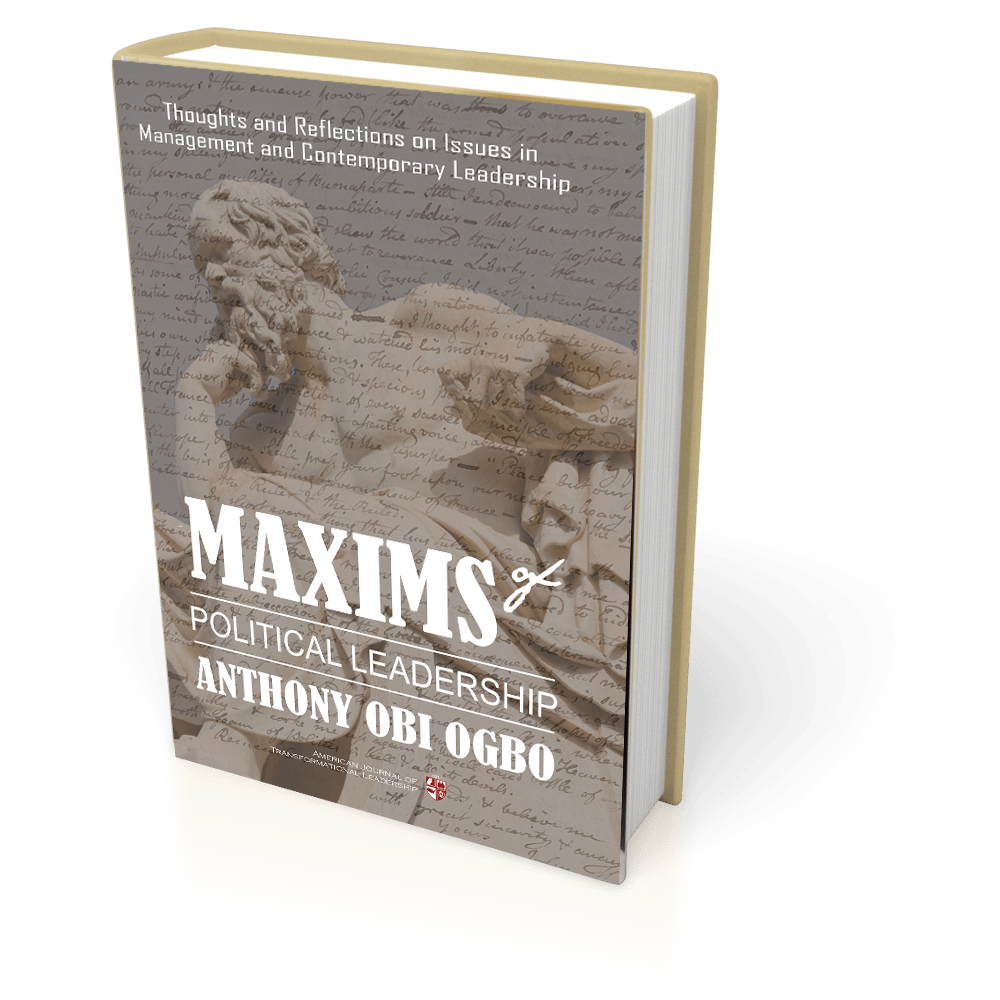
Nellie N. R. Onwuchekwa B.Sc. M.ILD
The science of leadership is not static because of interlacing idiosyncrasies and variables. In fact, every leader comes with individual perspective of style, goals or personal values. These concepts make it difficult to premise ‘ideal leadership’ on any particular philosophical grounds. Dr. Anthony Ogbo’s Maxims of Political Leadership explores varieties in management and leadership dimensions – from coffee retailing business, to newsroom activities, through institutional and national management platforms. He further delves into the micro and macro elements of leadership relevant to a nation, its peoples, and interactions of conflicting principles – all in the quest to effective leading and managing.

From “Managing Nonsense” through “I love my Job”, this book explains how the leader’s best option would be to create and implement a leadership or management model that conforms organizational mission, structure, and imminent challenges. A leader’s high-handedness, like young Dr. Ogbo in The Guardian Newsroom, insensitively focusing only on corporate goals with little or no feelings for employee welfare, quickly signals absolute control – naturally impacting job security and loyalty. Thus, ethical sense of balance is a requirement in creating the path to organizational leadership success.
Traversing through different management and leadership practices, Maxims of Political Leadership is an eye-opener to organizational and political leaders, who are oftentimes mesmerized by appropriate ethical approaches for effective leadership. Ethical Leadership is indeed complex, and dealing with work complication continues to be a major leadership development issue. As work becomes more complex, so does the leader’s ethical dilemma. The leader’s personal values are constantly put to test; as the Author states:
“Beyond the scope of constitutional rules, leaders are judged by rightness or wrongness of their actions; the capacity of their moral idiosyncrasy, and their ability to identify and manage their emotions, in conjunction with the emotions of others”.
This book also brings the innate desire by every leader to be exemplary and successful in leading people to the fore. Every leader yearns to lead responsibly, but still struggles to make ethical decisions in a highly complex operational environment. This issue validates the fact that leaders are more effective when they think at a high degree of complexity. Then they would be able to understand their organization, and seamlessly manage challenges from multiple perspectives when making difficult decisions. As Richard Jacobs[1] noted in his work on organization theory:
“If managers and leaders are to scratch beneath the surface and delve into the substance of their organizations, what is needed is ‘cognitive complexity,’ which can be defined as the intellectual ability of a manager or leader to envision the organization from multiple and competing perspectives so as to develop a depth of organizational understanding that is at least equal to the factors impacting its functioning.”
Again, managing people ethically continually remains a daily struggle for managers and leaders. Maxims of Political Leadership elevates the importance of preparation for leadership. ‘Preparation’ is not just focusing on academic qualifications and other hands-on training prerequisites, but also denotes the cognitive and emotional readiness to take on the business of managing people towards organizational success. For instance, Nick Petrie[2] in his paper on leadership development, cautioned that the methods that have been used in the past to develop leaders, really, truly, categorically would not be enough for the complexity of challenges which are on their way for organizations (and broader society).
In explaining the epistemology of leading, this author provides practical solutions to the ‘disparaging afflictions of leading beyond the conjectural boundaries of organizing people, their hope, and aspiration’. The author offered substantial clues on how leaders or managers could harness resources and translate their communal crises into a plantation of economic possibilities. Thus, Leaders and Managers must cultivate the ‘Bones’ to effectively manage the complications that leading requires. Ogbo stated:
“In political leadership, the knowledge of leadership must come with a plan. It must be noted that leaders who delve into various leadership compartments without strategies barely succeed. They would struggle from one illusionary project to the other, under uncomplimentary political environment. In the same vein, they would crash into their own unpreparedness and blame their woeful outcomes on political adversaries. However, strategy is not a talking point, but a structured developmental tool that could steer a leader to establish a viable, effective and sustainable outcome.”
Leading people, joggling ethical balls, and achieving the required balance on the sensitivity ropes of management require constantly refining the ‘Bones’ to be able to make tough decisions. An exceptional leader would aspire to be legendary, the author soliloquizes:
“If I were a leader, I would characterize core cognitive ability, emotional, and interpersonal competencies. I would articulate accuracy in self-awareness, self-management, and desire for excellence; exhibit the ability to adjust styles in other to meet situational demands.”
Certainly, the author hit the nail by the head in his focus on the intellectual, emotional, and interpersonal capacities relevant in effective management and leadership. Clearly, exceptional leadership stresses the mental faculties – requiring the leader to cognitively reinforce and challenge his soul toward a positive orientation awareness on a daily basis.
Maxims of Political Leadership intrusively captured very basic points often missed by the Human Resources (HR) as business continue to expand. According to Dr. Ogbo:
“As the innovation process progresses, it might be necessary for the HR to focus on maximizing employee productivity by creating strategies to protect the company from workforce uncertainties. HR must also be considerate in rules that harmonize with the innovation development structures…”
The impact of technology and innovation on business operations cannot be underrated. No matter the size of any enterprise, technology has both tangible and intangible benefits that could help organizations to stabilize and produce desired results for stakeholders. Dr. Ogbo passionately proposes the need for organizational realignment across all tiers of business structure. Technology and Innovation (Digital Transformation) should be a top-down process. A path could be created toward integrating technology with human resources. Stressing the need for functional alignment, Dr. Ogbo submits that technology and innovation do not run themselves – no matter how digitalized. Leaders must ensure company culture transforms organically, while providing a safe haven for employees who make “honest mistakes” – and, utilizing errors as ‘learnings’ for best practices. Outright sanctions would deprive organizations of internal vulnerabilities that they can learn from in strengthening the organization.
The Author in “Teaching a Man to Fish” exhaustively brought out core lessons on economic empowerment. Dr. Ogbo observed that:
“Teaching a Man to Fish is one thing, but moving them through a competitive terrain of austere economic environment is significantly another factor, because this would release them from any uncomplimentary fiscal bondage, especially those augmented by an unequal social system”.
As reading progresses, the distinction between ‘Leadership’ and ‘Management’ was clear; Dr. Ogbo exposed the complexities in organizational leadership and individual ethics. ‘Leadership’ will continue to focus on the ability to effectively and responsibly engage with people, processes, and programs, to achieve organizational, team, or individual goals. Management, however, pays deeper attention in ensuring a specific goal outcome – typically tasks completion – in line with approved processes and guidelines. Leading and Managing require codes for organizational effectiveness – some kind of ethical framework, which directs behaviors and actions within the organization. Interestingly, ethical leadership requires that the ‘Leader’ is also subject to supervision!
Maxims of Political Leadership delves further to expose the disconcerting and depressing effects of some ‘Designer Phrases’. Dr. Ogbo warns: “A controlled use of metaphors in organizational environment would prevent a contamination of attitude, loyalty, and approach to duties.” He cautions organizational leaders to watch their tongues because of the dangers inherent in the use of ‘designer phrases’ that might affect individual and organizational performance.
Every leader – or
aspiring leader – must read, assimilate, practice, and lead by Maxims of Political Leadership. As Ogbo concludes, “being in the front seat does not make one a leader; It is only a
sitting arrangement.” Leadership is coalition and melding of hard and soft
skills to yield desired results. The discipline requires hard and smart work.
[1] Cited from the work of Richard Jacobs, “Analyzing organizations through cognitive complexity.” Professor of Public Administration at Villanova University, Dr. Jacobs is active in research and publication. He has authored books, monographs, and numerous articles. Paper was retrieved from http://www83.homepage.villanova.edu/richard.jacobs/MPA%208002/Powerpoint/cogcomp/index.html
[2] Petrie N. (2014). Future Trends in Leadership Development. Center for Creative Leadership. https://www.ccl.org/wp-content/uploads/2015/04/futureTrends.pdf
—————
■ Nellie N. R. Onwuchekwa, B.Sc. M.ILD, is the author of Influence of Love
Maxims of Political Leadership: Thoughts and Reflections on Issues in Management and Contemporary Leadership


Leave a Reply